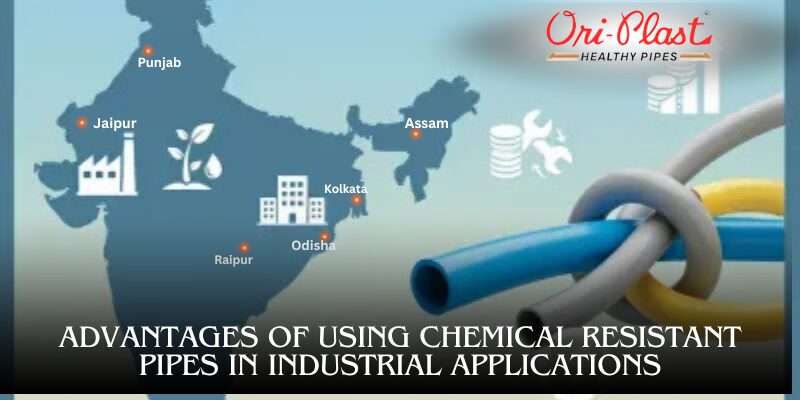Why Do Assam, Kolkata, Odisha, and Beyond Need Chemical Resistant Pipes?
Industrial facilities in regions such as Assam and Kolkata often manage aggressive chemicals, wastewater, and corrosive liquids. In chemical plants of Odisha or in the pharmaceutical hubs of Jaipur and Raipur, pipelines are exposed to environments that traditional materials like steel or basic PVC just can't withstand. The chemical resistant pipes become critical infrastructure because they:- Prevent corrosion and leaks, protecting sensitive processing environments
- Extend maintenance intervals, which is crucial for cost-effective industrial operation
- Ensure product purity, especially in food or pharma sectors found in Punjab and Guwahati
Growth & Future Trends
According to recent industry reports, the Indian pipes and fittings market reached $659 million in 2024 and is projected to grow to over $900 million by 2033, at a CAGR of 3.59%. This growth is accelerated by increasing adoption of chemical resistant pipes across industrial hubs like Odisha and Kolkata due to infrastructure programs and stricter environmental standards. Notably, sectors using high volumes of chemicals, such as Assam’s petrochemical industry and Odisha’s manufacturing, are leading the demand for advanced, corrosion-resistant solutions.Top Benefits of Chemical Resistant Pipes
Superior Chemical Resistance for Maximum Safety
Pipes in pharmaceutical units of Guwahati or the chemical processing plants in Jaipur must handle acids, bases, salts, and solvents daily. Only specialized chemical resistant pipes can withstand these harsh environments, reducing the risk of pipe failure or leaks that could threaten worker safety or contaminate product batches.Reduced Maintenance for Cost Savings in Raipur and Kolkata
In industrial cities like Raipur or Kolkata, reducing operational costs is a priority. Since chemical resistant pipes resist scaling, clogging, and degradation, they need fewer breakdown repairs—saving companies significant money on shutdowns or part replacements.Longevity and Extended Service Life
Factories in Punjab and manufacturing hubs in Assam appreciate the 50-100 year lifespan of modern chemical-resistant piping. Cyclical replacements are minimized, further protecting investments and reducing waste, which aligns with India's sustainability goals.Applications Across Indian Industry
From Guwahati to Jaipur, the versatility of chemical resistant pipes is unmatched:- Chemical manufacturing: Handle storage and transfer of acids and hazardous solutions.
- Pharmaceuticals: Ensure purity and prevent product contamination.
- Wastewater treatment: Safely manage aggressive effluents.
- Oil & gas: Transport petroleum products and processing chemicals.
- Food & beverage: Prevent metal leaching and bacterial contamination.
How to Choose the Right Chemical Resistant Pipe Material
When sourcing for projects in Kolkata or Odisha, decision-makers should prioritize:- Material (PVC, CPVC, HDPE, PTFE, etc.) suited to their chemical profile
- Pressure and temperature ratings required for application in factories or plants
- Local supplier presence for after-sales support and rapid turnaround
Comparing Chemical Resistant Pipes Vs. Traditional Pipe Materials
Traditional metal pipes in Raipur frequently corrode in acid-heavy industries, while basic plastics might warp under heat seen in Punjab’s processing plants. In contrast, chemical resistant pipes provide:- Longer lifespan in tough environments
- Consistent mechanical integrity under stress
- Lower maintenance and environmental cost
Installation and Maintenance Advantages
Units in Assam and Kolkata value the ease-of-installation of modern, lightweight pipes, reducing downtime and allowing for modular plant upgrades. Their maintenance-free operation adds to their appeal, especially for remote facilities or high-throughput operations.Environmental and Compliance Considerations
Chemical processing in Jaipur and Raipur faces stringent regulatory standards. Chemical resistant pipes not only help manufacturers meet environmental norms (by preventing leaks and contamination) but also cut compliance-related delays and costs.Conclusion:
Chemical resistant pipes have emerged as the backbone of reliable, efficient, and safe industrial infrastructure across India’s manufacturing and processing sectors—from Assam’s refineries to Jaipur’s pharmaceutical plants. Their ability to withstand harsh chemicals, high temperatures, and constant operational pressures has made them indispensable for protecting both assets and the environment. By reducing leaks, extending lifespan, and cutting maintenance costs, these pipes enable businesses in places like Kolkata, Guwahati, Punjab, and Odisha to focus on growth without the worry of costly downtime or regulatory setbacks. Whether updating existing systems in Raipur or launching greenfield projects in Odisha, investing in chemical resistant pipes ensures operational continuity, compliance with industry standards, and peace of mind for years to come. Ultimately, careful selection, proper installation, and collaboration with reputable suppliers empower Indian industries to thrive safely and sustainably in a competitive global market.Frequently Asked Questions (FAQs)
What are chemical resistant pipes?
Chemical resistant pipes are piping solutions designed to withstand aggressive chemicals, corrosive materials, high temperatures, and pressures, making them vital in industries from Odisha to Assam.Where are chemical resistant pipes most commonly used?
They are used in chemical manufacturing, pharmaceuticals, wastewater treatment plants, and food & beverage lines across cities like Kolkata, Guwahati, and Jaipur.Are these pipes available in various materials?
Yes. HDPE, PVC, CPVC, PTFE, and other advanced thermoplastics.Why not use metal pipes?
Metal pipes can corrode, contaminate products, or fail prematurely, especially in Bengal’s chemical industries.How long do chemical resistant pipes last?
With proper installation, they can last up to 100 years.Can they be used in food processing?
Absolutely—these pipes maintain purity and prevent leaching.How do they help in sustainability?
By reducing leaks, replacements, and contamination, they lower environmental footprint.Is maintenance complicated?
No. These pipes require minimal maintenance, a huge benefit for factories in remote Assam.What about regulatory compliance?
Their use helps companies meet Indian and international safety standards.Do they cost more upfront?
Sometimes, but the long-term savings in maintenance and replacements offset the initial cost.What determines the best material choice?
The chemicals handled, temperature range, and industry guidelines.How are these pipes installed?
Most are modular, lightweight, and can be field-installed by trained technicians.How do you ensure leak-proof joints?
Advanced welding and joining systems ensure reliable, leak-proof networks.Are they suitable for high temperatures?
Yes, especially grades like PTFE or advanced CPVC.

